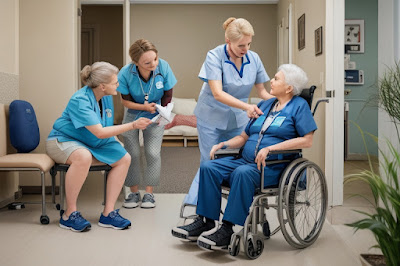Title: The Job and Significance of Home Nursing in Medical care:
Title: The Job and Significance of Home Nursing in Medical care:
Home nursing assumes a urgent part in present day medical services by giving customized and merciful consideration to people in the solace of their homes. This thorough outline will dive into the meaning of home nursing, its advantages, challenges, and the advancing scene of locally established medical care.
Grasping Home Nursing:
Definition and Degree:
Home nursing includes clinical consideration, assistance with daily activities, and continuous encouragement of patients within their homes.
ADMINISTRATION ADMINISTRATION:
Home attendants administer prescriptions, perform operations, screen for vital signs, assist with personal hygiene, and recommend patient friendliness.
Upgraded Comfort and Accommodation:
Patients receive care in natural environmental elements, promoting comfort and reducing the stress associated with emergency clinic visits.
Customized Care Plans:
Home medical attendants tailor care to each patient's unique needs and trends, advancing individualized therapy.
Cost-effectiveness:
Home nursing administrations can be more financially savvy than setting up a medical clinic, reducing medical service costs for patients and medical service frameworks.
Independence Support:
Home nursing engages patients in maintaining independence and autonomy while receiving basic medical support.
More developed outcomes:
Studies show that patients who receive a locally based care experience make more progress, including reduced readmissions to medical clinics and increased personal satisfaction.
Home Attendant Jobs:
Care Coordination:
Home medical attendants work closely with patients, families, physicians, and other medical care professionals to ensure consistent coordination of care.
Wellness Education:
Home attendants teach patients and families about their conditions, medications, and self-care strategies, engaging them to participate effectively in their medical services.
Daily Reassurance:
In clinical terms of the past, home health caregivers offered daily encouragement, friendship, and support to patients and their families, creating a holistic approach to coping with recovery. Is.
Support:
Home medical attendants advocate for patients' freedoms and inclinations, guaranteeing that their voices are heard in the dynamic cycles of medical services.
Benefits of home nursing for patients:
Autonomy and Pride: Home nursing empowers patients to take care of themselves while maintaining their dignity and independence.
Natural Climate:
Living in their own homes allows patients to surround themselves with recognizable people, possessions, and schedules, which promote deep well-being.
Less chance of contamination:
In home settings there is less exposure to persistently unsophisticated specialists, reducing the risk of health care-related illnesses.
Adaptive Maintenance:
Home nursing offers customized care plans tailored to patients' specific needs and inclinations, upgrading the appropriateness of treatment.
Family Support:
Home nursing empowers the family to constantly reflect, develop a strong organization, and work on understanding outcomes.
Difficulties and considerations:
Safety concerns: Home conditions can introduce health hazards that must be addressed to guarantee the well-being of both patients and home medical caregivers.
Parental Personality Burnout:
Family caregivers may experience burnout due to demands to consider, requiring support administration and break care.
Access to Assets:
Satisfactory access to medical care assets, including talented home nursing professionals, medical supplies, and medications, is fundamental to compelling locally located care.
Administrative and payment issues:
Administrative systems and payment methods can vary among districts, affecting the accessibility and affordability of home nursing care.
The Ultimate Fate of Home Nursing:
Mechanical Developments: Advances in telemedicine, remote monitoring gadgets, and advanced wellness steps are transforming home nursing, empowering more effective correspondence and information-based care delivery.
Adult population:
With an aging population and chronic illnesses becoming more common, interest is set to grow for home nursing, which requires innovative responses to meet medical care needs.
Incorporated Care Models:
Cooperative models that integrate home nursing with critical care, specialized management, and local area assets are emerging to provide comprehensive and comprehensive patient care.
Support and Strategy Drives:
Supportive efforts and strategy changes are fundamental to advancing the integration of home nursing into a quality medical services framework, guaranteeing impartial entry to locally established quality care for all.
Conclusion
Home nursing assumes a fundamental role in existing medical services by providing customized, hands-on practice.
.jpeg)



.jpeg)
.jpeg)

Comments
Post a Comment